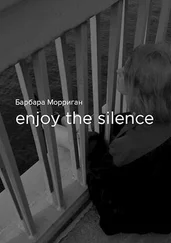J. Jones - The Silence
Здесь есть возможность читать онлайн «J. Jones - The Silence» весь текст электронной книги совершенно бесплатно (целиком полную версию без сокращений). В некоторых случаях можно слушать аудио, скачать через торрент в формате fb2 и присутствует краткое содержание. Жанр: Исторический детектив, на английском языке. Описание произведения, (предисловие) а так же отзывы посетителей доступны на портале библиотеки ЛибКат.
- Название:The Silence
- Автор:
- Жанр:
- Год:неизвестен
- ISBN:нет данных
- Рейтинг книги:5 / 5. Голосов: 1
-
Избранное:Добавить в избранное
- Отзывы:
-
Ваша оценка:
- 100
- 1
- 2
- 3
- 4
- 5
The Silence: краткое содержание, описание и аннотация
Предлагаем к чтению аннотацию, описание, краткое содержание или предисловие (зависит от того, что написал сам автор книги «The Silence»). Если вы не нашли необходимую информацию о книге — напишите в комментариях, мы постараемся отыскать её.
The Silence — читать онлайн бесплатно полную книгу (весь текст) целиком
Ниже представлен текст книги, разбитый по страницам. Система сохранения места последней прочитанной страницы, позволяет с удобством читать онлайн бесплатно книгу «The Silence», без необходимости каждый раз заново искать на чём Вы остановились. Поставьте закладку, и сможете в любой момент перейти на страницу, на которой закончили чтение.
Интервал:
Закладка:
As Werthen turned into the Alleegasse he could see, beneath the now melting snow on the cobblestone street, that straw had earlier been spread. As he progressed up the street, he saw that the dried stalks extended for several blocks. It was a Viennese custom to spread straw to muffle the traffic noise for those of wealth, power, and/or prominence who had been taken ill.
The Palais Wittgenstein was an impressive, if dour town house of two floors, its banks of second-story windows seeming to frown down on the Alleegasse while the bottom floor presented a fortress-like appearance. The facade was at least fifty paces in length. Werthen entered through a pair of heavy oak doors, behind which a Portier was stationed and directed him via a forecourt with an impressive fountain and ample grillwork to an entrance hall huge and imposing. The floor was done in mosaic, the walls in carved paneling. Frescoes also adorned the space as did a statue, which Werthen thought might be the work of the French sculptor August Rodin. He passed through stone arches and went up six marble stairs to glass double doors. There he was met by a liveried servant who led him up the central red-carpeted marble stairway to the second floor and ultimately into Karl Wittgenstein’s study, appointed in the most opulent gilt furnishing Werthen had seen outside a museum. Incongruously, modern paintings hung on the red plush walls, artists from Vienna and Munich, with Klimt prominent among them. On an immense carved walnut desk in the middle of the room were several small sculptures, obviously the work of Rodin. A fire pulsed in an open porcelain fireplace.
Wittgenstein sat at the desk, a bear of a man, who seemed even larger once he stood to greet Werthen, offering a crushing handshake. The man’s dark hair was cut short (and perhaps dyed at the temples) and he wore a thick black moustache. He appeared much younger than his fifty-two years, wearing a frock coat, striped silk vest, maroon paisley bow tie under a fresh collar, and sporting spats — the newest fad from America. Werthen could not stop his eyes from traveling to these white canvas shoe coverings; for him they were too similar to the splatterdashes he had worn as a youth to protect his riding boots from mud to be considered high fashion. But fancy young men from Manhattan to Paris were wearing them this season, and it seemed Karl Wittgenstein or his tailor had decided to join the throng. It was hardly a fashion statement Werthen would have credited the man of business with.
‘Your good friend Klimt sings your praises,’ Wittgenstein said as he finally released Werthen’s pummeled hand. The man’s voice was deep and booming.
‘He is too kind,’ Werthen said, sitting in the pale-blue Louis Quinze chair Wittgenstein waved him toward. The industrialist sat in a matching chair, facing him, and crossed his legs by placing his right ankle over his left knee, American style.
‘I suppose he’s filled you in on the commission?’
‘He mentioned a missing son.’
‘ Mein Gott. Hardly missing in the strictest sense. But he hasn’t shown up for work in a week. He’s the manager of mining interests at my Vienna offices on Kolowatring. Lord knows what the boy’s thinking of. Always did have his head in the clouds. Wanted to be a musician of all things.’
Werthen registered this, but was not yet ready to follow the path of inquiry that comment might lead to.
Instead, he said, ‘Perhaps we could review the facts. When was it first noticed that your son was missing?’
‘Well,’ the big man re-crossed his legs, ‘Poldi, my wife, remarked last Tuesday, I believe it was, that Hans had not taken his dinner with us as is our custom. He is single, you see, and has a suite of rooms here. Then I found out from Prohaska, the second in command at the mining division, that Hans was not there on the Monday, either. No message. Nothing.’ Wittgenstein shook his head. ‘No sense of responsibility.’
The age-old complaint, Werthen thought: The younger generation is going to the dogs. Parents had been complaining of it since ancient Greece.
‘Perhaps I might speak with your wife after we are finished here?’
Wittgenstein shook his head so violently that jowls, until now undetectable, shook.
‘Afraid she is indisposed. Worry over her son has brought on migraine.’
Which, Werthen now understood, explains the straw in the street outside.
‘I must be blunt, Advokat Werthen. It is because of Poldi that I have summoned you. She needs the reassurance.’
‘And you, sir?’
‘It’s obvious, isn’t it? The boy’s taken himself off for a fling. I did the same thing myself when my father insisted I go into his property management. Ran off to New York and played guitar in a saloon for a year before I came back home, tail partly between my legs. I hardly credit Hans with the temerity to run off to the New World, though. He’s probably holed up with some sweet young thing in the Inner City. Just trying to show his independence. But he’ll be back. In the end, he’s a Wittgenstein. We know our duty.’
Werthen marveled at the man’s self-assurance. He could only imagine his own emotions were a child of his to go missing for a week.
‘Has your son been missing before?’
‘Skipped the odd lesson, I should say. My children are educated at home. The best instructors. Hans would hide out from Latin lessons to play his piano. Poldi, you see. She is a great one for the music. All the children play instruments. Other than that, no. .’
The statement had the tone of uncertainty.
‘Nothing?’ Werthen pursued.
‘The blasted Theresianum. I blame that school.’
The Theresianum was the most prestigious Gymnasium or preparatory school in Vienna. It was called the ‘knights’ academy,’ for Empress Maria Theresa had established it in the eighteenth century to educate the young aristocrats of the realm to become administrators and political leaders. The nobles were still the only ones admitted as boarding students; the bourgeoisie had been permitted admittance as day students for the last half-century. Jews, assimilated or not, rarely gained entrance. Werthen knew this only too well; he himself had been denied admission. In any case it had not been his wish to attend the snobbish Theresianum, but rather his parents’. He had felt great relief being forced to attend the more liberal and secularized Akademische Gymnasium leading up to his entrance to the University of Vienna.
Werthen figured that Wittgenstein must have paid very dearly indeed to get his child into the exclusive school. He most likely pulled in debts of all sorts from influential colleagues and far-flung relations to win that coup.
‘You said your children were educated at home.’
‘Yes, well, Hans did mope about so that I relented in his case. Allowed him to study at the Theresianum for two years. He fell into bad company there. It was then he began digging in his heels about going into the family business.’
Just as you had earlier, Werthen wanted to remind the man, but knew it was not his place to do so.
Herr Wittgenstein paused for a moment, then said, ‘Ultimately, they chucked him out. Missed his lessons, forever playing the piano.’
‘Anyone in particular?’ Werthen asked.
Wittgenstein shot him an uncomprehending look.
‘The bad company Hans fell into.’
‘How should I know?’ Herr Wittgenstein said with sudden impatience. ‘I was engaged in business at the time. But it was then he started his campaign to become a composer. I told him to leave the composing for Sundays, but he became even more sullen than before. You would think the masters at the Theresianum would have knocked some sense into the boy. After all, one paid enough for the education.’
Читать дальшеИнтервал:
Закладка:
Похожие книги на «The Silence»
Представляем Вашему вниманию похожие книги на «The Silence» списком для выбора. Мы отобрали схожую по названию и смыслу литературу в надежде предоставить читателям больше вариантов отыскать новые, интересные, ещё непрочитанные произведения.
Обсуждение, отзывы о книге «The Silence» и просто собственные мнения читателей. Оставьте ваши комментарии, напишите, что Вы думаете о произведении, его смысле или главных героях. Укажите что конкретно понравилось, а что нет, и почему Вы так считаете.











